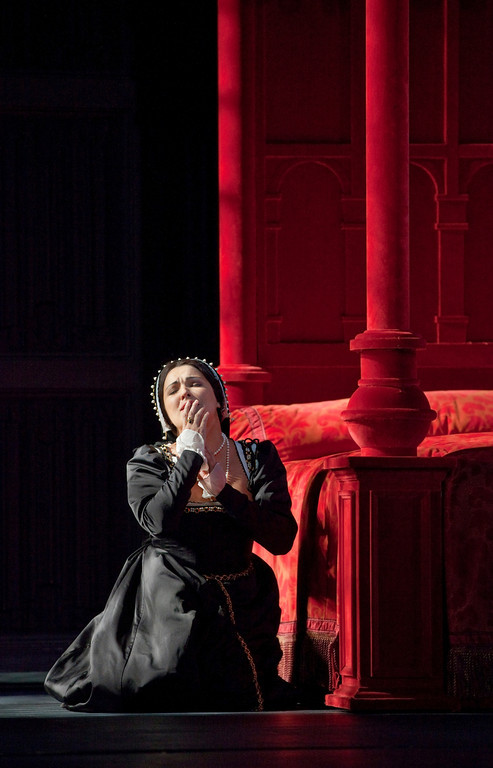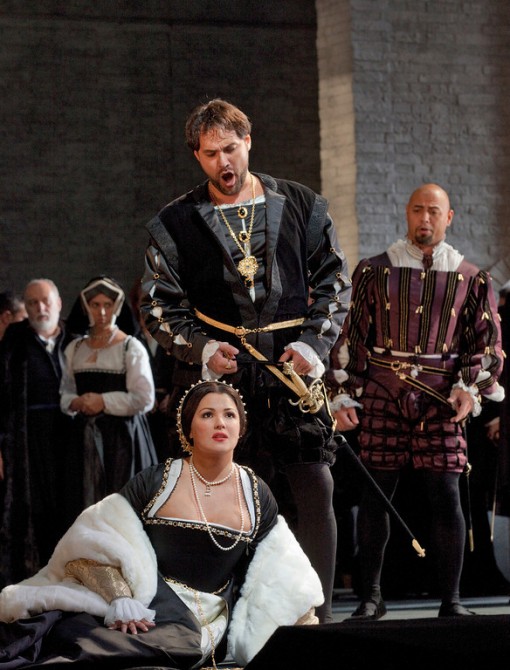Netrebko opens Met season with compelling star turn in “Anna Bolena”

Anna Netrebko stars in the title role of Donizetti's "Anna Bolena," which opened the Metropolitan Opera season Monday night. Photo: Ken Howard/Metropolitan Opera
There was a lot riding on the premiere of Donizetti’s Anna Bolena in 1830. The composer had made a name for himself with fizzy comedies and well-crafted tunes across most of Italy. But it was success in Milan he was after and here, finally, was a chance to make his mark at the upstart Teatro Carcano, which was launching an opera series to rival La Scala. Blessed with some of the best singers of the time and an inspired libretto by Felice Romani, Donizetti’s portrayal of the final days of Anne Boleyn, second wife of Henry VIII, became a sensation in Milan and around the world.
The stakes were not quite as high for Peter Gelb, the Metropolitan Opera’s general manager, who decided to launch the company’s 2011-12 season with Anna Bolena, which had its belated company debut Monday night.
Singers from Maria Callas to Joan Sutherland have championed the work and, in Russian soprano Anna Netrebko, Gelb had a ready-made star for the title role. Bringing in a British team led by director David McVicar and costume designer Jenny Tiramani, a world authority on sixteenth-century dress, he took the opportunity to refine his recipe for a new Met production.
Netrebko debuted the role of Anna in Vienna last spring to widespread acclaim. But the production was risibly staid and most critics agreed it was a musical triumph best enjoyed with one’s eyes shut.
Here, McVicar strikes a skillful balance between detail-obsessed historicity and modern dramaturgy. The court of Henry VIII comes alive in the costumes painstakingly reconstructed from Hans Holbein paintings and in the oppressive atmosphere in which clusters of black-stockinged courtiers murmur among themselves outside the queen’s chambers. Donizetti’s take on Anne Boleyn as a popular queen whose unjust execution is mourned by subjects is quietly corrected in McVicar’s hand: her closest ladies-in-waiting might weep, but the rest of the court is too paralyzed with fear to lift a finger.

Ildar Abdrazakov as Enrico, Anna Netrebko as the title character, and Keith Miller as Lord Rochefort in Donizetti's "Anna Bolena." Photo: Ken Howard/Metropolitan Opera
The sets by Robert Jones offered clean lines and relatively few historical specifics, aside from a beautifully carved wooden panel that helped set the scene in Act I. The subsequent drama, in which Anna is set up with her former lover Lord Percy and framed for adultery, played out in stark empty rooms with stylized architectural details. No cluttered chambers, thick with oppressive velvet here: this queen – who’s given to fainting – has not even a couch to sink down on.
All this adds to the sense of desperate dignity of Netrebko’s Anna. You see the effort it costs her to stand straight in the face of the king’s suspicion and open impatience to get rid of her. Met audiences know how capable Netrebko is of physical acting in comedies like Don Pasquale. Here, her role and her stiff, voluminous dresses, impose a more disciplined acting style – most of it vocal. Every lovingly crafted phrase and subtle change in tone color serves to give meaning to her lines, whether they show her conversing or praying, reflecting or rebelling. Netrebko is not afraid to take her time, even when her entrance comes in the midst of an agitated scene, nor to pull back to a more quiet register.
Marco Armiliato was her ally in the pit and showed himself to be a master at building up musical textures. Armiliato and Netrebko seemed to understand each other intuitively: there were moments, such as Anna’s pleading with Percy to seek love elsewhere, when Netrebko played with the timing of a phrase with her back turned to the conductor: a sign of trust he fully deserved.
The rest of the cast offered solid support. Ildar Abdrazakov was a disciplined Henry, Ekaterina Gubanova a shade cool vocally as the guilt-racked Giovanna (Jane) Seymour. Stephen Costello brought a smooth, flexible tenor to his heartfelt portrayal of Lord Percy and managed to make even the most difficult runs sound like music. Tamara Mumford was outstanding as the hapless page Smeaton, whose youthful crush on the queen inadvertently leads to disaster.
But the evening belonged to Netrebko who seems to passionately believe in her character. Her mad scene at the end when, minutes before her execution, she loses her mind and has flashbacks to her childhood and her early romance with Percy might not be historically founded but Netrebko gave it just the right mix of pathos and credibility. There is always a consistent fire in Netrebko’s heroines, and her final gesture, before walking out to meet the axe, was to wrap her long hair around her wrist and lift it up to expose her neck, proud and defiant.
Anna Bolena will be performed through October 28th as well as on February 1st and 4th. Angela Meade will sing the title role October 21, 24 and 28. 212-362 6000; metopera.org.
Corinna da Fonseca-Wollheim is an arts journalist in New York. Her articles on music have appeared in the Wall Street Journal, the New York Sun, Tablet, The Daily, and Symphony Magazine.
Posted Oct 15, 2011 at 9:49 pm by peter wolf
Ildar was a ‘disciplined Henry’ ? Oh, he was a whole lot more than that. He was sensational. The Wall Street Journal is right. He was simply amazing. Oozing menacing dread, eyes flashing in barely contained rage, he carries every scene he’s in. I plan to watch a repeat of this opera when it comes around again at the theatres, so I can watch Ildar’s performance again. He is easily the finest bass in opera today.